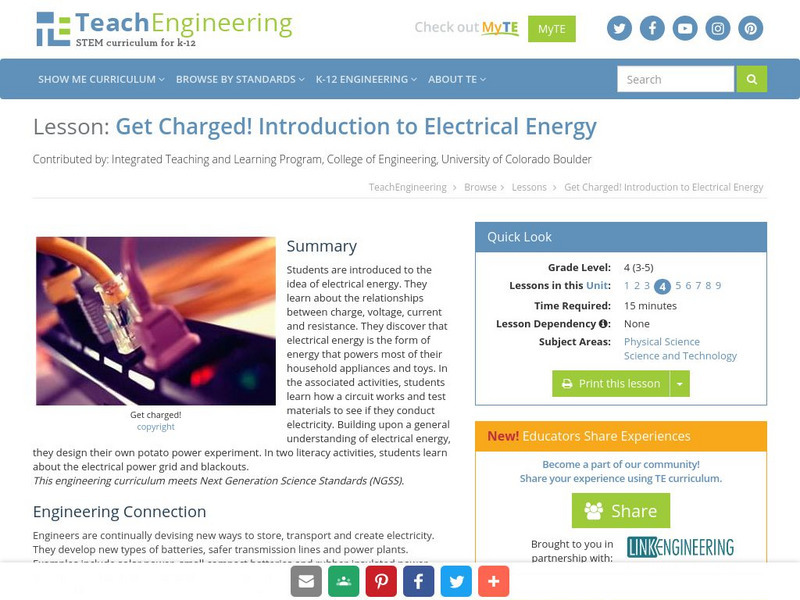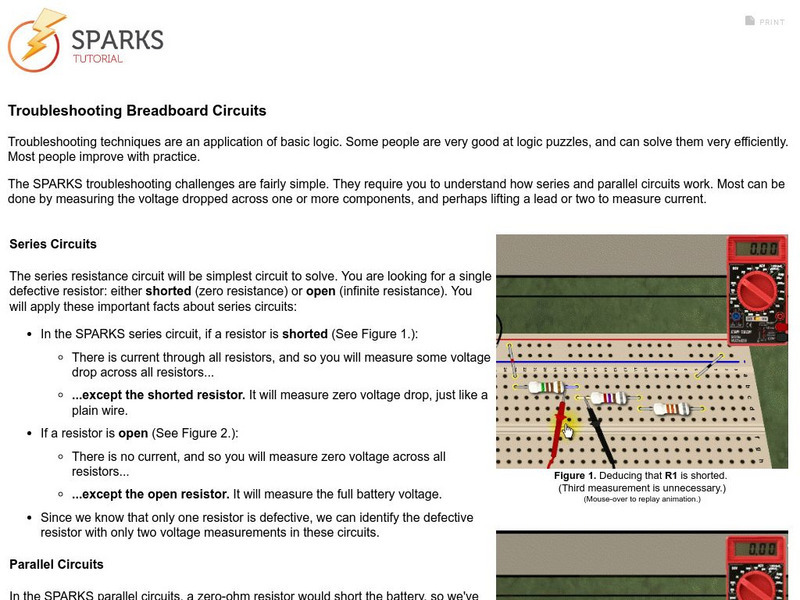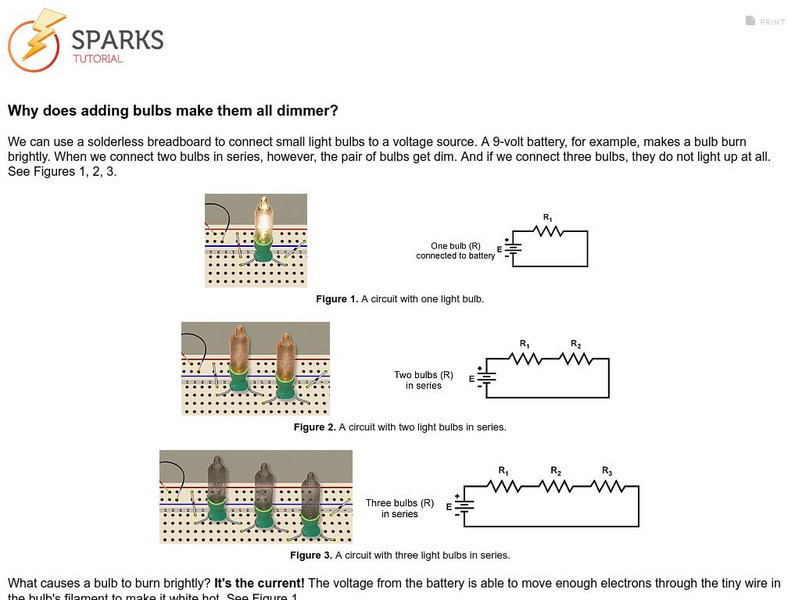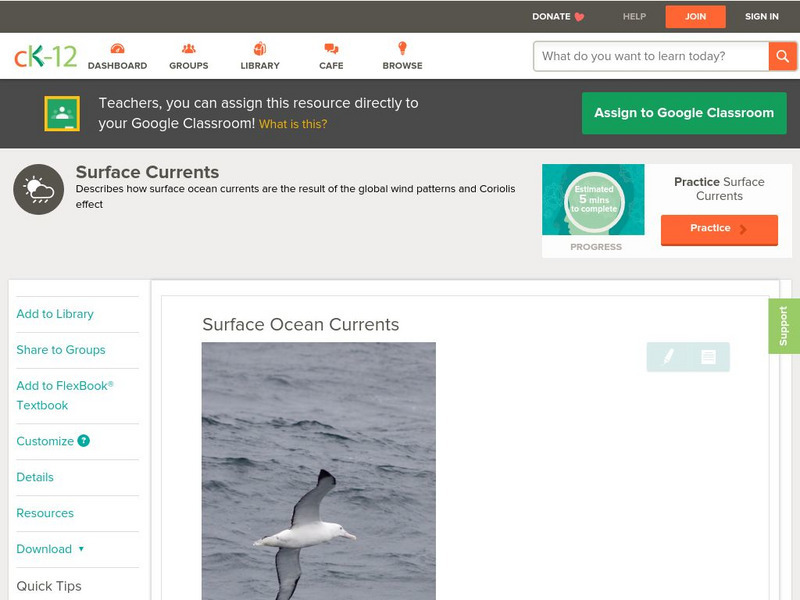Physics Aviary
Physics Aviary: Parallel Circuit Lab
This lab is designed to have students investigate the relationships between voltage, resistance and current in a parallel circuit with up to three passive components. The batteries in this simulation can be varied from ideal batteries to...
Physics Aviary
Physics Aviary: Rl in Ac Lab
This lab was designed to help students understand the difference between circuits powered by DC and circuits powered by AC. Students can see that simple changes in frequency lead to changes in the potential difference across the...
eSchool Today
E School Today: Electricity
Explore current electricity and different types of electric circuits.
TeachEngineering
Teach Engineering: Get Charged!
Students are introduced to the idea of electrical energy. They learn about the relationships between charge, voltage, current and resistance. They discover that electrical energy is the form of energy that powers most of their household...
Physics Classroom
The Physics Classroom: Power Revisited
This tutorial visits the concept of power. You will learn to develop new equations that express power in terms of current, electric potential difference and resistance.
Physics Classroom
The Physics Classroom: What Is an Electric Circuit?
In this tutorial the concept of electric potential difference is discussed. Electric potential is the amount of electric potential energy per unit of charge that would be possessed by a charged object if placed within an electric field...
University of St. Andrews (UK)
University of St. Andrews: Georg Simon Ohm
More than a dry series of facts about Ohm's life, this page from the University of St. Andrews provides interesting anecdotal accounts which reveal the personality behind the man. Thorough, interesting and an abundance of facts. A great...
Concord Consortium
Concord Consortium: Calculating Reactance
Find out how the current in a circuit can be impeded by three types of circuit components.
Concord Consortium
Concord Consortium: Troubleshooting Breadboard Circuits
Try these SPARKS troubleshooting breadboard circuit challenges.
Concord Consortium
Concord Consortium: Why Does Adding Bulbs Make Them All Dimmer?
This tutorial illustrates why adding bulbs to a circuit makes all the bulbs dimmer.
Physics Classroom
The Physics Classroom: Electric Circuits: Circuit Connections: Parallel Circuits
When two or more electrical devices in a circuit are connected, it is known as a series connection or a parallel connection. When all the devices are connected using parallel connections, the circuit is referred to as a parallel circuit....
CK-12 Foundation
Ck 12: Earth Science: Surface Ocean Currents
Describes how wind patterns and other factors cause ocean surface currents. [Free Registration/Login may be required to access all resource tools.]
CK-12 Foundation
Ck 12: Earth Science: Deep Ocean Currents
[Free Registration/Login may be required to access all resource tools.] How different densities of water drive ocean currents.
CK-12 Foundation
Ck 12: Parallel Circuits
[Free Registration/Login may be required to access all resource tools.] In this lesson, students learn about parallel circuit design, and how to calculate equivalent resistance from resistors in a parallel circuit.
CK-12 Foundation
Ck 12: Physics Simulation: Doorbell
[Free Registration/Login Required] Understand how magnetic fields generated by solenoid coils can be used to create an operating doorbell using this interactive simulation. A PDF worksheet and a video tutorial are also available. [1:51]
CK-12 Foundation
Ck 12: Physics Simulation: Dollhouse
[Free Registration/Login Required] Learn about the analysis of parallel circuits in the context of a realistic household circuit using our interactive simulation. A PDF worksheet and a video tutorial are also available. [3:24]
CK-12 Foundation
Ck 12: Physics Simulation: Telegraph
[Free Registration/Login Required] Explore the concept of Morse Code and how signals are transferred over great distances by using telegraph machines based on electromagnets using our interactive simulation. A PDF worksheet and a video...
CK-12 Foundation
Ck 12: Physics Simulation: Power Lines
[Free Registration/Login Required] Learn about the relationship between electric potential, current, and resistance in the context of high-voltage AC power lines using this interactive simulation. A PDF worksheet and a video tutorial are...
CK-12 Foundation
Ck 12: Physics Simulation: Galvanometer
[Free Registration/Login Required] Understand how the magnetic field generated by loops of current-carrying wire is used to create measuring devices like voltmeters and ammeters with this interactive simulation. A PDF worksheet and a...
Other
Magnet Man: Cool Experiments With Magnets
Here is a lengthy listing of activities and resources pertaining to magnets and magnetism. Experiments which can be performed with many different types of magnets are described; detailed directions and photos are provided.
CK-12 Foundation
Ck 12: Physics Simulation: Marquee Lights
[Free Registration/Login Required] Learn about different ways you can wire an electric circuit, and how the brightness of the lights depends on how they are configured using this interactive simulation. A PDF worksheet and a video...
Khan Academy
Khan Academy: Right Hand Rule
Learn the convention for describing the direction of magnetic fields. Challenge questions are included.
Khan Academy
Khan Academy: Electrical Engineering: Introduction
Some basic concepts to introduce the electrical engineering course. Become familiar with engineering numbers and notation, and learn about the two most important electrical quantities: current and voltage.
Khan Academy
Khan Academy: Electric Potential Difference and Ohm's Law Review
Review the key terms, equations, and skills related to Ohm's law, including how electric potential difference, current, and resistance are related.















